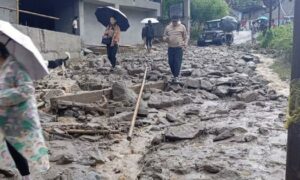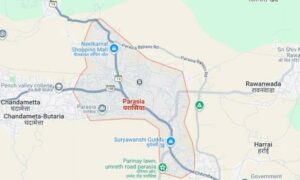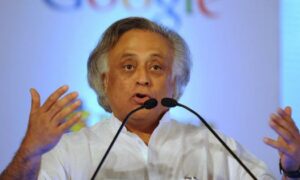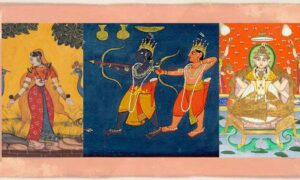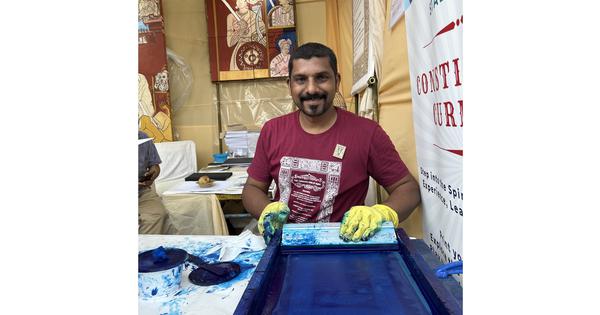
“Have you seen the Constitution?” Vinay Kumar, 40, asked everyone who looked into the stall as he pointed to the tome resting on a wooden stand.
Visitors to the “Constitution Curious” stall at the Durgotsab puja pandal in Delhi’s Greater Kailash neighbourhood gasped on discovering a replica of the original Indian Constitution, as calligraphed by Prem Behari Narain Raizada and illustrated by Nandalal Bose.
Kumar invited them to flip through its pages and take in a piece of history. In addition to going through the not-so-little book, visitors could take a short quiz based on the Constitution and win a prize. Or they could print for themselves a copy of the preamble using a screen-printing contraption made by Kumar.
An engineer and lawyer by training, Kumar told Scroll that he designs medical devices for a living. But he gave up having a full-time job years ago to practice his art and activism.
In five days at the stall , he made over a thousand copies of the preamble free of cost for those who visited the stall. The initiative was the result of a collaboration between two non-profit organisations: the Delhi-based National Foundation for India and Kumar’s own Reclaim Constitution.
Sandwiched between a Domino’s outlet and hoardings that advertised real estate deals, “Constitution Curious”, at first glance, appeared out of place in the pandal. But the location had been chosen deliberately, Biraj Patnaik of the National Foundation for India explained later.
“We are increasingly of the belief that we should go to all kinds of places, including those of cultural and religious significance, and try to engage people where they are,” said Patnaik. “A lot of the work that we development organisations do has moved very far from the art, culture and everyday lives of people.”
That is the gap that Kumar, too, has sought to plug over the past six years. In 2019, when protests erupted across the country against the Modi government’s Citizenship Amendment Act, he joined a reading circle in Bengaluru.
“I noticed that constitutional experts with a fantastic body of work were far removed from the language of the common people,” he remembered thinking at the time. “They had fantastic ideas, great depth, but they were somehow not accessible.”
Since then, Kumar has grappled with the challenge of communicating the Constitution. He started with making cartoons, memes and songs before turning his attention to postcards.
On Republic Day 2023, he launched Reclaim Constitution with postcards featuring quotes from members of the Constituent Assembly. Kumar estimates that he has distributed over 2.5 lakh of them. Eventually, however, he gravitated away from them because he thought they were “elitist”.
“Only the lettered could read them and the whole thing was very intellectual,” he reasoned. “It was working but it was almost like preaching to the choir.”
He was searching for a form that would bring the Constitution alive when he came up with the idea of screen-printing copies of the preamble. The simple setup is made participative by Kumar asking people to place paper on the wooden plate and lend a hand – quite literally – to brush ink onto it through a printing mesh.
“If they don’t press it, it won’t work,” he said. “I am only guiding the angle of the brush. It is humanly impossible to print so many preambles by myself.”
This arrangement fits squarely with Kumar’s stated philosophy. He chose the name “Reclaim Constitution” because, in his view, the Constitution belongs to the people, not lawyers or politicians.
The rest of the “magic”, as Patnaik described it, is in the conversations that Kumar has with visitors while printing copies of the preamble for them. I witnessed it myself when I heard him chat with Abhijit Majhi, a 20-year-old student of Delhi University who visited the stall on Wednesday.
Kumar caught the college student looking at a painting in the Constitution that depicted Mohandas Gandhi’s visit to Noakhali during the riots that preceded Partition. “Do you know what is happening in Manipur?” he asked him. Communal violence, the student answered.
“Our government tells us that everything is fine in Manipur,” Kumar said as Majhi kept nodding in agreement. “Now look at this. Our Constitution accepts that we had riots. But it also shows Gandhi trying to stop riots. This is our heritage.”
And just like that, the Constitution went from being a dour legal document to an active tool that this young man could use to seek accountability from his government.
Here is a summary of last week’s top stories.
Revised voter roll. At least 47 lakh names were deleted from the voter list in Bihar as the Election Commission published the final electoral roll after conducting a special intensive revision in the state. Concerns had been raised that the revision process could disenfranchise many voters.
This came ahead of Assembly elections expected to be held in October or November.
The poll panel has defended the revision as a clean-up exercise to remove names of the deceased, duplicate entries and undocumented migrants ahead of the elections.
The Supreme Court has said that the exercise could be set aside if it was found to be illegal. The next hearing is on October 7.
Tense borders. Defence Minister Rajnath Singh claimed that Pakistan was expanding its military infrastructure along the Sir Creek, an estuary that separates Gujarat’s Kutch from the Sindh province of Pakistan. He also warned Islamabad against misadventures in the area.
The 96-km estuary is the site of a territorial dispute between India and Pakistan. While New Delhi holds that the boundary between the two countries lies in the middle of the creek, Islamabad claims that the boundary lies on the eastern bank.
Singh accused Pakistan of harbouring “ill intentions” about the creek, saying that India has tried to resolve the matter through dialogue several times.
The defence minister said that during the 1965 war, the Indian Army had demonstrated that it was capable of reaching Lahore. “Today, in 2025, Pakistan must remember that one route to Karachi passes through the creek,” he asserted.
Stampede at Vijay’s rally. The Madras High Court constituted a Special Investigation Team to probe the stampede at actor-politician Vijay’s rally in Tamil Nadu’s Karur district, which left 41 persons dead. The SIT will be headed by Inspector General of Police Asra Garg.
Justice N Senthilkumar criticised Vijay’s party, the Tamilaga Vettri Kazhagam, for “abandoning” the site after the incident and said it had shown no remorse. The court also said that it cannot shirk its responsibility.
The stampede took place on September 27 when Vijay was addressing supporters of his party from his campaign vehicle.
Also on Scroll last week
Follow the Scroll channel on WhatsApp for a curated selection of the news that matters throughout the day, and a round-up of major developments in India and around the world every evening. What you won’t get: spam.
And, if you haven’t already, sign up for our Daily Brief newsletter.
📰 Crime Today News is proudly sponsored by DRYFRUIT & CO – A Brand by eFabby Global LLC
Design & Developed by Yes Mom Hosting

